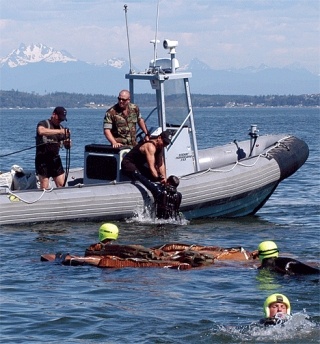A Navy unit with expertise in blowing stuff up, as well as preventing stuff from blowing up, will be leaving Whidbey Island Naval Air Station next year, according to a Navy spokesman.
The move has nothing to do with a lawsuit brought by an environmental group, Navy officials say, but it could affect the litigation, which focuses on the unit’s underwater explosives training.
Sean Hughes, spokesman for Navy Region Northwest, said Navy officials made the decision in April of this year to move Explosive Ordnance Disposal Mobile Unit 11 from Whidbey to Imperial Beach, Calif.
“The idea of putting them with the rest of EOD is to reduce stress on personnel by reducing training away from home and to cut costs …” he said. “It’s mainly a quality of life issue for them.”
Hughes said the unit will start locating next spring and finish in the fall. Two small teams from EOD will remain under Navy Region Northwest.
The Whidbey community won’t soon forget the members of EODMU-11, who have the very dangerous mission of disposing of improvised explosive devices in Iraq.
Six members of EODMU-11 have been killed in the war in Iraq. They are Petty Officer 2nd Class Kevin Bewley of Hector, Ark., Chief Petty Officer Patrick L. Wade of Manawa, Wis., Petty Officer 1st Class Jeffrey L. Chaney of Omaha, Neb., Chief Petty Officer Gregory Billiter, Petty Office 2nd Class Curtis R. Hall and Petty Officer 1st Class Joseph Adam McSween.
As part of the unit’s training, they conduct underwater explosives exercises at Puget Sound, including Oak Harbor’s Crescent Harbor. The practice came under scrutiny six years ago when fisheries biologists estimated that about 5,000 fish died in Crescent Harbor from the detonation of a five-pound explosive charge.
Public Employees for Environmental Responsibility, known as PEER, and Wild Fish Conservancy sued the Navy earlier this year to stop damage to protected marine life from the Navy’s underwater demolitions training program.
In a press release, PEER declared a victory in the lawsuit last month, stating that the Navy has agreed to dramatically scale back the use of explosives in the sensitive waters of Puget Sound.
While Hughes admits that the explosive exercises will be curtailed, he said the reason is because EODMU-11 is moving to Southern California.
In Crescent Harbor, the unit normally conducted 10 to 12 training events a year. Starting in 2010, only four exercises will be done each year.
“That may need to change according to any evolving threat,” Hughes said.
In addition, Hughes said a marine biologist will observe the training site prior to any explosions in order to make sure no marine mammals or threatened species are nearby. The Navy will limit the exercise to 2.5-pound explosives.
Adam Draper, staff attorney for PEER, said he’s hopeful the lawsuit will be settled amicably and that the Navy will comply with state and federal laws protecting the environment.
“In terms of Puget Sound, this is great,” he said. “But we hope that they’re not just moving it to another area.”



